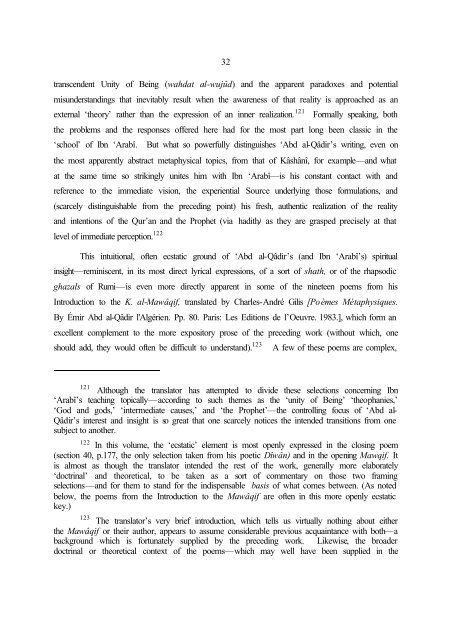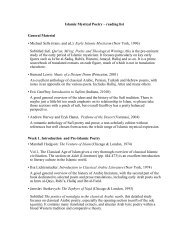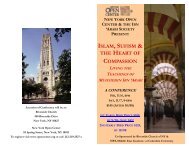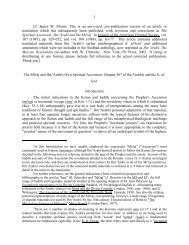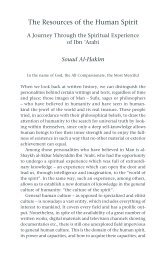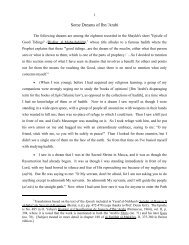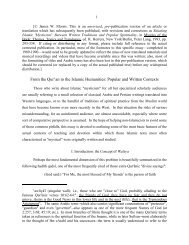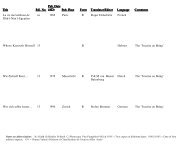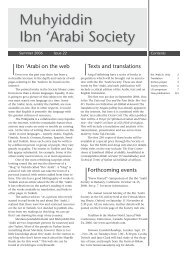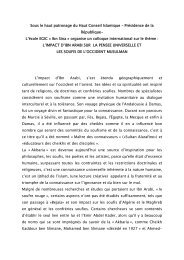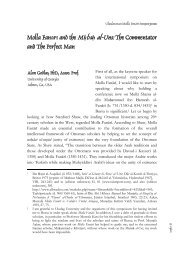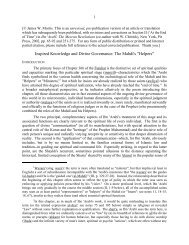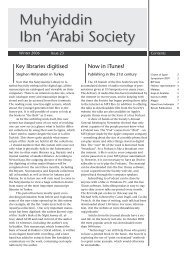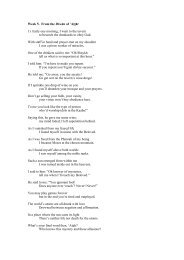Part III (pdf) - Muhyiddin Ibn Arabi Society
Part III (pdf) - Muhyiddin Ibn Arabi Society
Part III (pdf) - Muhyiddin Ibn Arabi Society
You also want an ePaper? Increase the reach of your titles
YUMPU automatically turns print PDFs into web optimized ePapers that Google loves.
32transcendent Unity of Being (wahdat al-wujûd) and the apparent paradoxes and potentialmisunderstandings that inevitably result when the awareness of that reality is approached as anexternal ‘theory’ rather than the expression of an inner realization. 121 Formally speaking, boththe problems and the responses offered here had for the most part long been classic in the‘school’ of <strong>Ibn</strong> ‘Arabî. But what so powerfully distinguishes ‘Abd al-Qâdir’s writing, even onthe most apparently abstract metaphysical topics, from that of Kâshânî, for example—and whatat the same time so strikingly unites him with <strong>Ibn</strong> ‘Arabî—is his constant contact with andreference to the immediate vision, the experiential Source underlying those formulations, and(scarcely distinguishable from the preceding point) his fresh, authentic realization of the realityand intentions of the Qur’an and the Prophet (via hadith) as they are grasped precisely at thatlevel of immediate perception. 122This intuitional, often ecstatic ground of ‘Abd al-Qâdir’s (and <strong>Ibn</strong> ‘Arabî’s) spiritualinsight—reminiscent, in its most direct lyrical expressions, of a sort of shath, or of the rhapsodicghazals of Rumi—is even more directly apparent in some of the nineteen poems from hisIntroduction to the K. al-Mawâqif, translated by Charles-André Gilis [Poèmes Métaphysiques.By Émir Abd al-Qâdir l'Algérien. Pp. 80. Paris: Les Editions de l’Oeuvre. 1983.], which form anexcellent complement to the more expository prose of the preceding work (without which, oneshould add, they would often be difficult to understand). 123 A few of these poems are complex,121Although the translator has attempted to divide these selections concerning <strong>Ibn</strong>‘Arabî’s teaching topically—according to such themes as the ‘unity of Being’ ‘theophanies,’‘God and gods,’ ‘intermediate causes,’ and ‘the Prophet’—the controlling focus of ‘Abd al-Qâdir’s interest and insight is so great that one scarcely notices the intended transitions from onesubject to another.122In this volume, the ‘ecstatic’ element is most openly expressed in the closing poem(section 40, p.177, the only selection taken from his poetic Dîwân) and in the opening Mawqif. Itis almost as though the translator intended the rest of the work, generally more elaborately‘doctrinal’ and theoretical, to be taken as a sort of commentary on those two framingselections—and for them to stand for the indispensable basis of what comes between. (As notedbelow, the poems from the Introduction to the Mawâqif are often in this more openly ecstatickey.)123 The translator’s very brief introduction, which tells us virtually nothing about eitherthe Mawâqif or their author, appears to assume considerable previous acquaintance with both—abackground which is fortunately supplied by the preceding work. Likewise, the broaderdoctrinal or theoretical context of the poems—which may well have been supplied in the


